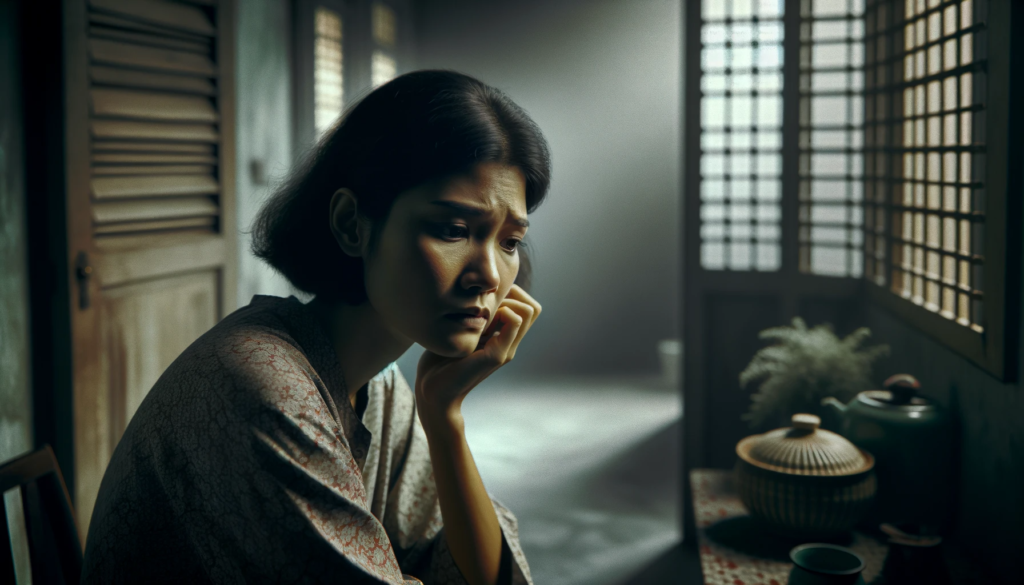Have you ever found yourself feeling isolated because of particular motherhood taboos? You’re not alone.
As a society, we’ve come a long way in discussing topics around motherhood, but there’s a range of taboos still lingering, often silenced by judgment, expectations, and sometimes, our own faith.
By understanding and addressing these motherhood taboos, we not only pave the way for healthier mental, emotional, and spiritual lives but also build stronger faith-based communities.
Let’s dive in.
What are Motherhood Taboos?
Motherhood taboos are pervasive, unspoken rules that govern the expected behavior, feelings, and discussions permitted for mothers.
These cultural and social restrictions can encompass a variety of subjects from fertility, childbirth options, and parenting styles to the intricate balance of professional and domestic life, as well as the rarely discussed postpartum mental health issues.
Such taboos are deeply embedded in societal expectations, historical narratives, and sometimes, erroneously in religious doctrines.
They have the power to suppress honest conversation, uphold false ideals, and create a solitary experience for mothers who do not conform to these standards.
These issues are not merely theoretical; they have tangible implications on a mother’s wellbeing.
When a mother feels unable to voice her struggles with fertility, for instance, or feels judged for her work-life choices, she may endure feelings of inadequacy, isolation, or anxiety.
It is crucial to challenge these taboos, encourage open discussions, and foster supportive environments to ensure that motherhood is an experience shared openly and supported universally, free from judgment and misconceptions.
The Historical Context Of Motherhood Taboos
The fabric of motherhood is interwoven with a multitude of expectations, judgments, and an often-imposed silence on its intricate realities.
This silence around certain elements of motherhood has historically relegated them to the shadows of taboo.
The portrayal of what constitutes a “good mother” has transformed over the ages, yet the persistent undertone of societal pressure endures.
Several dimensions of motherhood have remained consistently cloaked as too sensitive or provocative for open discussion, further solidifying their taboo status.
Take, for instance, the biblical story of Hannah, a symbolic representation of the perennial struggles related to motherhood taboos.
In the scriptural account found in 1 Samuel 1:6-8, Hannah’s anguish over her infertility is palpable.
In her time, childbearing was not merely a biological process but a critical component of a woman’s identity and her societal function.
The inability to conceive, as experienced by Hannah, became a source of profound distress, silently borne and exacerbated by societal expectations.
Her sorrow was intensified by the taunts of Peninnah, her co-wife, and while her husband Elkanah’s love was a comfort, it fell short of comprehending the full extent of her inner turmoil.
This scenario underscores not just the personal desire for motherhood but also the immense pressure exerted by societal norms.

Women who faced fertility challenges often carried an unwarranted burden of shame, as their worth and societal standing were questioned.
The concept that motherhood represents the zenith of a woman’s purpose has been pervasive in numerous cultures and historical periods.
Women unable to reach this conventional milestone were, and in some cases continue to be, treated with a spectrum of reactions ranging from patronizing sympathy to outright disdain or suspicion.
The resonance of Hannah’s narrative extends far beyond its historical context, reflecting the shared experiences of countless women across centuries.
Even as societies progress and women make monumental strides in various fields, echoes of these archaic taboos linger in contemporary motherhood.
Modern women face scrutinies of a different guise—judgments passed on working mothers, unwelcome scrutiny over parenting styles, or the often-concealed struggle with postpartum depression.
Although the specific nature of the taboos may have evolved, their existence and impact remain palpable.
An appreciation and acknowledgement of these historical contexts not only fosters solidarity with women of the past but also arms us with a greater capacity to confront and challenge the remnants of these taboos today.
It is through such understanding that we can attempt to lift the veil of silence, promote an environment of open dialogue, and ensure that mothers receive the support and recognition they deserve.
Only by confronting these age-old stigmas can we hope to cultivate a society in which motherhood, in all its forms and complexities, is celebrated without reservation or judgment.
Current-Day Motherhood Taboo Reality
The landscape of motherhood is ever-changing, yet certain taboos stubbornly persist, creating an environment that can be less than supportive for modern mothers.
Despite the advancements in recognizing women’s autonomy and the myriad of roles they play, motherhood remains subject to intense scrutiny and is bound by outdated expectations.
The comparison of old-world expectations and modern-day realities creates a clash where mothers feel pressured from all angles.
On one hand, they are expected to uphold the idealized image of a nurturing, ever-present caregiver; on the other, they are encouraged to pursue professional ambitions and personal growth, often leading to a sense of inadequacy in either or both roles.
In the digital age, the challenges of motherhood are magnified through the lens of social media.
Platforms that could offer community and support often foster comparison and unrealistic standards instead.
The curated glimpses of perfection in parenting on Instagram or Facebook can be discouraging to those who are navigating the messy, unfiltered realities of motherhood.
Furthermore, increased awareness of parenting styles and child development has paradoxically contributed to the intensity of motherhood taboos.
With a deluge of information at their fingertips, mothers may feel overwhelmed and judged by the endless opinions on how they should raise their children.
Every choice, from dietary preferences to educational philosophies, is open for public commentary, often leading to polarizing views and shaming.

Even as we acknowledge the psychological impacts of postpartum depression, the conversation around it is still riddled with stigma.
Mothers are encouraged to speak up but are often met with platitudes or dismissive attitudes when they express anything less than joy in their new role.
Similarly, discussions about the challenges of balancing work and life responsibilities are commonplace, but the societal infrastructure to support this balance lags, leaving mothers to navigate a labyrinth of logistics and emotions.
The discourse around motherhood needs to evolve to match the reality of current-day mothers’ lives.
They should not have to feel that their worth is measured by their adherence to archaic standards or their ability to emulate a flawless facade propagated by the media.
Instead, society must shift towards embracing and supporting the diverse experiences of motherhood.
To mitigate the harmful effects of these taboos, there must be a collective effort to validate and normalize the full range of mothers’ experiences, including the struggles and the less-than-picture-perfect moments.
Educational initiatives, supportive policies such as comprehensive parental leave, flexible work arrangements, and accessible childcare solutions are crucial.
Moreover, the power of community cannot be underestimated.
Creating safe spaces for mothers to connect, share their stories, and offer mutual support can counteract the isolation that these taboos often create.
It is through these measures that we can hope to dismantle the taboos surrounding motherhood, allowing for a reality where mothers can thrive without the weight of judgment and unrealistic expectations.
Motherhood Taboo 1: Postpartum Depression
Unlike the ‘baby blues’ that many mothers experience shortly after birth, PPD is a severe, long-lasting form of depression.
Despite its prevalence, it remains shrouded in secrecy and stigma.
Mothers with PPD often hesitate to seek help, fearing judgments like, “Isn’t motherhood supposed to be the happiest time of your life?”
Such taboos prevent women from accessing the support they crucially need, isolating them further.
Postpartum depression (PPD) stands as a poignant emblem of the contemporary motherhood taboos that remain entrenched in silence and stigma.
It is a mental health condition that extends far beyond the typical ‘baby blues,’ which are relatively brief and commonly experienced by mothers following childbirth.
PPD, by contrast, is an intense and persistent form of depression that can deeply affect a mother’s well-being and her ability to bond with and care for her child.

The prevalence of PPD is not insignificant; it is a widespread concern impacting mothers across all cultures and socioeconomic backgrounds.
However, the shroud of secrecy that enwraps it is maintained by the societal stigma attached to mental health, particularly in the context of motherhood.
The societal expectation is that motherhood is intrinsically a period of unparalleled joy and fulfillment, which leads to a profound discrepancy between what mothers are supposed to feel and what they actually experience.
This disparity can cause women suffering from PPD to retreat into silence, exacerbated by the fear of being perceived as an inadequate mother or facing judgments questioning their joy and love for their child.
The stigmatization of PPD is further compounded by the often-unrealistic portrayals of motherhood in media and culture, where maternal struggles are glossed over in favor of a sanitized, idyllic image of mother and child.
This division between reality and representation can leave mothers feeling alienated and flawed when their personal experiences do not align with these idealized narratives.
Even the language surrounding PPD perpetuates its taboo nature.
Phrases that imply a mother should “snap out of it” or that suggest maternal depression is a sign of weakness are not only insensitive but destructive.
They reinforce a culture of silence where mothers are discouraged from speaking out about their struggles, leaving them to grapple with their symptoms in isolation.
Furthermore, the reluctance to openly discuss PPD impedes the dissemination of crucial information about its symptoms and treatments.
Education and awareness are vital in empowering mothers and their families to recognize the signs of PPD and to understand that it is a legitimate medical condition that can, and should, be treated with professional help.
The implications of untreated PPD are profound. It can impact the mother’s health, the infant’s development, and the well-being of the entire family.
Early intervention is key, and it begins with breaking the taboo and normalizing conversations about maternal mental health.
Healthcare systems also play a critical role in de-stigmatizing PPD.
Routine screenings during and after pregnancy, resources for support and counseling, and a general openness in discussions about mental health can pave the way for better outcomes for mothers and their families.

It is crucial to foster a societal climate where motherhood, with all its challenges, is discussed openly and honestly.
Breaking the taboo around PPD would signify a broader acceptance of the diversity of maternal experiences, encouraging a supportive community where mothers can seek and receive the help they need without fear of judgment.
Only through collective acknowledgement and action can we hope to lift the weight of these taboos and replace them with a narrative of compassion, support, and understanding for all mothers.
Motherhood Taboo 2: Balancing Work and Motherhood
The age-old debate of ‘working mom’ vs. ‘stay-at-home mom’ is a persistent societal debate that, despite advances in gender equality, continues to incite judgment and divide opinions.
This debate touches on deeply ingrained notions about gender roles and the nature of motherhood itself.
While the feminist movements have fought to ensure that women have the right to choose their own paths, whether in the workforce or in the home, the residue of outdated stereotypes lingers, tainting those choices with undue scrutiny and criticism.

For the working mother, the struggle is multifaceted. She may face censure for being “absent” from her children’s lives or for supposedly prioritizing her career over her family’s well-being.
Conversely, she might also be praised for being a role model, demonstrating to her children, especially daughters, that women can aspire to and achieve professional success.
Yet, this external validation is often accompanied by an internal conflict as she juggles deadlines with dinner times, business meetings with parent-teacher conferences.
On the other side of the spectrum, the stay-at-home mom may be subjected to a different brand of judgment.
Despite the full-time, exhaustive nature of managing a household and raising children, her contribution is sometimes undervalued, and her decision to focus on home life is often regarded as a lesser accomplishment than professional success.
She may encounter insinuations that she lacks ambition or is not making full use of her education or capabilities.

This polarized view fails to acknowledge the complexity of individual circumstances and the nuances of personal choice.
Each mother’s decision is influenced by a unique set of factors, including personal values, career goals, financial considerations, and the needs of her children.
The attempt to measure a woman’s worth or maternal commitment by her employment status is a reductive approach that overlooks the diversity of familial arrangements and individual aspirations.
In truth, the modern woman’s balancing act between career and family is a testament to her resilience and adaptability.
Rather than being forced to choose one over the other, many women seek a blend that works for their specific situation, often making considerable sacrifices along the way.
Society’s challenge, then, is to move beyond these binary categorizations and to cultivate an environment that respects and supports the variety of choices that women make.
Creating such an environment means extending support systems to working mothers, such as offering flexible work hours, adequate maternity leave, and accessible childcare.
It also means valuing the work of stay-at-home mothers, acknowledging the skills and effort required to manage a household and raise children.
Only when both choices are respected and supported without bias can the societal pressures that fuel this debate begin to dissolve, allowing women to make life choices that truly align with their individual desires and circumstances.
Motherhood Taboo 3: Doubting Your Abilities
With the rise of social media, today’s mothers are constantly bombarded with picture-perfect images of motherhood: crafty moms, fitness moms, gourmet-cooking moms – the list goes on. Amidst this digital cacophony, it’s easy for mothers to doubt their abilities.
“Am I doing enough?” “Are my kids missing out?” “Am I a good mother?”
These self-inflicted questions, often stemming from external pressures and unrealistic portrayals, can be incredibly damaging to a mother’s self-esteem and mental well-being.
The digital age has brought with it a new frontier for the age-old ‘working mom vs. stay-at-home mom’ debate, with social media platforms creating an arena where curated glimpses into motherhood are constantly on display.
This online panorama offers up an endless stream of images showcasing mothers who seem to manage it all with ease and grace: the fitness mom who snaps back to pre-pregnancy shape weeks after giving birth, the crafty mom who always has a creative project at the ready, the gourmet-cooking mom who whips up Pinterest-worthy meals daily.
Each of these personas adds a layer to the already complex tapestry of modern motherhood expectations.
The relentless showcasing of such idealized lifestyles can lead to an “expectation versus reality” crisis for many mothers.
They may find themselves questioning their parenting styles and life choices, falling into the trap of comparison, and feeling like they fall short of these seemingly attainable standards.
This digital mirage of perfection is deceptive, often omitting the chaos, the failures, and the mundane but necessary daily grind that all mothers experience.
Moreover, the pressure to conform to these digital standards can erode a mother’s confidence, leading to stress, anxiety, and in some cases, a sense of failure.
The pervasive feeling of not “doing enough” can be debilitating.
For a working mother, this might manifest in guilt over not being present for every moment or not partaking in every school activity.
For the stay-at-home mom, the pressure might come from not engaging in enough “enriching” activities or not maintaining a spotless, Instagram-worthy home.
These virtual comparisons are compounded by the echo chamber effect of social media, where like-minded individuals reinforce and amplify each other’s beliefs and behaviors, often to the exclusion of differing perspectives.
What is frequently missing from these online narratives is the reality that motherhood is inherently personal and diverse.
The ‘right’ way to be a mother cannot be distilled into a single image or lifestyle—it is a composite of countless decisions, sacrifices, and joys that vary wildly from one family to another.

To counteract the pressures of these digital age dilemmas, there’s a growing movement of mothers who are using the same social media platforms to push back against the tide of perfectionism.
They share unfiltered accounts of their daily lives, complete with the messes, the meltdowns, and the real-life challenges of parenting.
This movement toward authenticity can provide a much-needed counterbalance to the idealized images, reassuring mothers that they are not alone in their struggles.
Recognizing that each mother’s experience is unique and valid is essential.
It’s crucial for society—and for mothers themselves—to champion a culture of support where the focus shifts from comparison to camaraderie.
Whether a mother chooses to work, stay at home, or blend the two, her worth is not contingent upon how closely her life resembles the stylized snapshots of motherhood that flood her social media feeds.
Instead, it’s rooted in the love, care, and commitment she brings to her role—elements that are far too profound to be captured in a mere picture.
Motherhood Taboo 4: Choice and Judgment
From breastfeeding to formula feeding, to sleep training or co-sleeping, modern mothers face a myriad of choices.
But with every choice comes potential judgment.
In an era of information overload, where every decision is backed by a study, mothers often find themselves facing severe criticisms for their choices, further complicating their motherhood journey.
In essence, while modernity has brought forth freedoms and opportunities, it has also introduced new layers of challenges and taboos for mothers.
Recognizing these taboos is the first step toward creating a more understanding, supportive environment where every mother feels valued, understood, and empowered.
Motherhood is a terrain of contrasting opinions and myriad choices, each one potentially a flashpoint for judgment.

The debate over breastfeeding versus formula feeding, for example, is rife with strong opinions and emotions.
Breastfeeding, lauded for its health benefits and emotional bonding, is often held as the gold standard, yet this view dismissively ignores the complex realities some mothers face, such as medical issues, the demands of returning to work, or simply personal preference.
Formula feeding, on the other hand, while providing a viable alternative, can attract unwarranted criticism and guilt-shaming, with mothers feeling the need to justify their choices to a sometimes unforgiving audience.
Sleep strategies, too, stir up controversy. The decision whether to sleep train, adopt a co-sleeping arrangement, or find a middle ground is deeply personal.
Yet, it often attracts unsolicited advice and criticism.
What works for one child or family might not work for another, and the array of contradictory advice can be bewildering.
This informational discord is further amplified by an ever-growing body of studies, each suggesting dos and don’ts for almost every aspect of parenting.
Mothers find themselves at the crossroads of competing expert opinions, internet forums, and age-old wisdom, trying to navigate a path that is best for their child and themselves.
The burden of this “researched parenting” can be overwhelming, as it implies that every choice must be scientifically justified and backed by the latest trends in child development.
The resulting scrutiny can weigh heavily on mothers, who often feel they’re being assessed against a shifting set of benchmarks for what constitutes a “good” mother.
Modernity may have peeled back some of the traditional constraints on motherhood, allowing for greater flexibility and individual expression, but it has also exposed mothers to new dimensions of criticism and self-doubt.
The democratization of information has not necessarily led to a democratization of understanding or acceptance.
Moreover, these challenges are compounded by the internal taboos mothers may carry.
The fear of admitting struggles, the reluctance to ask for help, the internalization of the notion that a mother must be self-sacrificing and ever-capable—these are the modern echoes of ancient taboos that still find a way to infiltrate the consciousness of mothers, dictating their feelings of worth and competence.
Recognizing these challenges is indeed a pivotal step.
It opens up the conversation, allowing mothers to share experiences and find solace in the shared complexities of parenting.
Supportive communities, both online and offline, play a crucial role in breaking down these taboos.
They provide platforms for mothers to speak openly about their struggles without fear of judgment, to share knowledge, and to offer and receive advice that is empathetic rather than prescriptive.
In addition, the emergence of motherhood advocacy groups and parental education programs works to destigmatize the choices and challenges of motherhood.
These initiatives can drive home the point that there is no one-size-fits-all approach to parenting and that the “perfect mother” is a myth.
By promoting understanding and acceptance, we can move towards a culture that embraces the diversity of motherhood experiences and recognizes the individuality of each mother and child.
The journey of motherhood, with all its choices and challenges, is profoundly personal and often profoundly difficult.
Every mother’s path is unique and should be respected as such.
In a society where judgment can come too swiftly, it is crucial to foster a culture that empowers mothers to make decisions that are right for them and their families without the weight of collective scrutiny.
By advocating for a more understanding and supportive environment, society can help ensure that every mother feels not only valued and understood but also part of a larger community that celebrates the vast spectrum of motherhood.
Why Are These Taboos Harmful?
Understanding the detrimental impacts of these motherhood taboos is essential.
Their existence isn’t merely a social inconvenience; they’re real barriers that can stifle a mother’s emotional, spiritual, and mental growth.
Motherhood taboos are not just remnants of the past; they are actively harmful constructs that pervade many societies, significantly impacting mothers’ well-being.
These taboos can have a series of negative consequences, forming barriers that inhibit a mother’s emotional, spiritual, and mental development.
Firstly, these taboos perpetuate a culture of silence. When certain topics are deemed off-limits, mothers may feel unable to share their struggles or seek support.
For instance, issues like miscarriage, infertility, or feelings of inadequacy and resentment are often kept hidden, causing mothers to suffer in isolation.
This silence is a fertile ground for misconceptions to flourish and can prevent mothers from accessing the information and support they need.
The stigmatization that comes with these taboos also places an unfair emotional burden on mothers.
The judgment surrounding decisions like returning to work or choosing not to breastfeed can lead to significant stress and anxiety.
Mothers might constantly question their choices, feeling trapped between their desires and societal expectations, which can be paralyzing.
Moreover, these taboos can impede mental health support.
Conditions such as postpartum depression (PPD) or anxiety are often underreported and untreated due to the shame associated with admitting mental health struggles.
The pressure to appear joyful and completely fulfilled in motherhood can deter women from seeking help, leading to a worsening of symptoms that could otherwise be managed or treated.
On a spiritual level, motherhood taboos can create an inner conflict.
Many cultures have a spiritual or religious dimension to motherhood, idealizing it as a sacred duty.
When a mother feels disconnected from this ideal due to her lived experiences, it can lead to a profound sense of spiritual failure.
This dissonance can hinder a mother’s spiritual journey, leaving her feeling unworthy or disconnected from her community or faith.
In terms of personal growth, these taboos can limit a mother’s opportunities for self-discovery and self-expression.
Mothers often find parts of their identities subsumed by the role of ‘mother’, with personal interests and ambitions taking a back seat.
When society expects a mother to fit a certain mold, it disregards her individuality and the multifaceted nature of her identity.
Furthermore, these taboos are not only damaging to mothers but can also have a ripple effect on children and families.
When a mother is unsupported, her ability to provide nurturing care may be compromised.
Children learn by observing, and when they witness their mothers being judged or silenced, they may internalize these negative attitudes, perpetuating a cycle of shame and secrecy.
To dismantle these harmful taboos, it is crucial to foster open, non-judgmental dialogues around all aspects of motherhood.
Encouraging honest conversations, providing inclusive support systems, and advocating for policies that recognize the diverse experiences of mothers are all vital steps in this direction.
Only by acknowledging and confronting these taboos can we create a society that truly supports and empowers mothers in all their roles.

Mental Health Implications
Much like Hannah’s heart-wrenching silence, the taboos of modern motherhood have a profound psychological impact.
- Isolation: In the pursuit of being the “perfect” Christian mom, many women end up feeling isolated. When society sets an unrealistic standard, mothers who can’t or choose not to meet those standards may feel left out. They might hesitate to share their struggles, fearing judgment or ridicule. Over time, this sense of isolation can manifest into more significant issues like depression or anxiety.
- Stress & Anxiety: The constant juggle between societal expectations, personal aspirations, and the everyday challenges of motherhood can be stressful. When every decision is under the microscope, it’s natural for mothers to second-guess themselves, leading to heightened anxiety.
- Identity Crisis: Often, the weight of these taboos can cause mothers to lose sight of their identity outside of motherhood. When they feel pigeonholed into a singular role without room for flaws or growth, it can lead to feelings of being trapped or unfulfilled.
In essence, taboos around motherhood don’t just challenge a woman’s parenting choices; they challenge her identity, her worth, and her mental well-being.
Isn’t it ironic that a role as sacred as motherhood, so central to the Christian faith and the essence of nurturing, can be a source of such profound distress?
The Strain on Spiritual Growth
For a community rooted deeply in faith, the spiritual implications of these taboos are significant.
- Disconnected from Faith Community: Taboos can drive a wedge between mothers and their faith communities. When certain subjects are off-limits, mothers may feel like they don’t have a safe space within their church or spiritual groups. This sense of disconnection can prevent them from seeking spiritual guidance during their most trying times.
- Doubt & Guilt: For a Christian mother, the weight of these taboos is often intertwined with feelings of guilt. “Am I failing God by feeling this way?” “Is my struggle with motherhood a reflection of my wavering faith?” Such questions can plague their minds, leading to doubt and weakening their spiritual connection.
- Barriers to Prayer: Just as Hannah felt the societal pressures of her time, many mothers today might struggle to bring their true feelings and challenges to God in prayer, fearing they might be perceived as ungrateful or lacking faith. When certain topics become taboo, they can become barriers in one’s conversation with God.
In the grand tapestry of faith, every thread, every experience, and every challenge has its place.
By sidelining certain topics as taboos, we risk tearing this intricate fabric.
After all, isn’t our spiritual journey about finding God’s light in our darkest moments, seeking His guidance in our confusion, and feeling His unconditional love when the world judges us?
It’s time to break the chains of these taboos and let every Christian mother embark on a spiritual journey that is authentic, supported, and free from judgment.
Addressing Taboos with Christian Teachings
Seeking Guidance from Scriptures
The Bible, especially the NIV translation, is a reservoir of wisdom. For instance, Proverbs 31:25-30 showcases the strength and honor of a godly woman.
Empowering Women: Biblical Examples
Think of Mary, the mother of Jesus, who bore unimaginable burdens with grace and courage. By looking at her and many others, we can find solace and guidance.
Overcoming Barriers
Building a Supportive Community
We’re not meant to traverse this journey alone. By connecting with other Christian mothers, attending Bible study groups, and participating in faith-based discussions, we can break these taboos together.
Seeking Faith-Aligned Resources
You know those “Christian women resources” you search for? They’re crucial in navigating these waters.
Resources to Combat Taboos
Products such as Bible-based journals or Christian self-help ebooks can be lifelines. When shopping, remember to look for recommendations and testimonials. They’re often the best indicators of a product’s value.
Motherhood, with its joys and challenges, is a journey. By confronting and addressing motherhood taboos through a lens of faith, we can ensure a healthier, more fulfilling, and spiritually enriching experience.”

Motherhood Taboos FAQs
By addressing taboos, we ensure mental, emotional, and spiritual well-being, fostering a sense of community and understanding.
Absolutely. Women like Hannah and Mary faced various challenges, providing us guidance and hope.
They offer a perspective grounded in faith, helping women navigate challenges in line with Christian teachings.
Yes, many online Christian communities and faith-based blogs provide platforms to discuss, share, and seek advice on these topics.
These taboos often arise from cultural, traditional, or even misinterpreted religious beliefs, combined with societal expectations and stereotypes.
Churches can host discussions, create support groups, or provide resources addressing these challenges from a biblical perspective, promoting understanding and healing.
Definitely. Verses like Proverbs 31:25-30 and Psalm 127:3 offer insight and comfort regarding the strength and value of women and mothers.
In the digital age, mothers are constantly bombarded with idealized portrayals of motherhood on social media, leading to self-doubt and comparison. This can damage a mother’s self-esteem and mental well-being. Moreover, the abundance of information and opinions online can lead to heightened criticism and judgment of personal parenting choices, adding to the pressure and complexity of modern motherhood.
Being a listening ear, sharing your own experiences, and guiding them to faith-based resources can make a huge difference.
Absolutely. While faith-based resources provide a spiritual perspective, the challenges of motherhood are universal. Everyone benefits from fostering a more understanding and supportive environment for mothers.